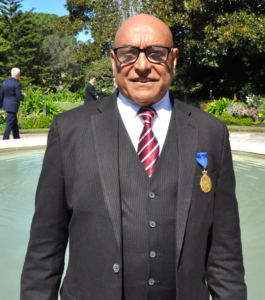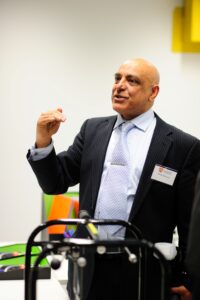From the Aga Khan Medical Centre in Khorog to the Delegation of the Ismaili Imamat building in Ottawa and beyond, Ashak Nathwani is using his expertise in sustainable design and engineering to help the Aga Khan Development Network (AKDN) reach its net-zero carbon target and sharing his knowledge to help build a more sustainable world.

Ashak immigrated to Australia in 1972 when the then-President Idi Amin ordered the expulsion of Asians from Uganda. Since, he has provided decades of engineering services for many iconic buildings, receiving a Paul Harris Fellow Award for services for humanity in 2010 and a Member of the Order of Australia award for services to the Ismaili Community in Australia in 2017.
Volunteering has always been a part of Ashak’s upbringing, as his late father and family members had volunteered in their local community. “It’s been…inculcated in us, in terms of volunteering our services,” he said. Ashak has contributed his expertise and time extensively to the AKDN, consulting on numerous international projects, training and empowering local staff, and educating communities on the importance of sustainability.
For Ashak, becoming a volunteer in the Network was serendipitous. “It’s sometimes called being at the right place at the right now or the wrong place at the wrong time,” he said with a laugh.
Ashak had just transitioned from working in the industry to working part-time at the University of Sydney, where he honed his years of involvement and knowledge in specialized fields of sustainable buildings. One of these fields was comfort analysis – the study of energy consumption and indoor comfort. “You can save a lot of energy if I was to turn off the lights in your room… but you will not be comfortable,” he explained. “Many people don’t associate [comfort] with sustainability because many people concentrate on just energy and things like that.”
Conducting comfort analyses marked the beginning of Ashak’s AKDN journey – he conducted these for all the Ismaili Centres and the Delegation building, and gradually expanded his consultations to all aspects of sustainability for AKDN buildings. Now, he is helping the Network reduce greenhouse gas emissions in institutional buildings to reach net-zero emissions.

“The first phase of [reaching net-zero emissions] is to minimize… to try and get the energy usage to as little as possible, recognizing that we cannot get to zero energy because you need cooling, you need heading, you need lights,” explained Ashak. The second phase is to look at the energy needed to operate the building and its facilities and consider solutions like generating energy through solar panels or purchasing green energy.
As an expert, Ashak also shares his knowledge on sustainable engineering with local staff members. He is currently working with the Aga Khan Agency for Habitat to produce a video training course for facility managers on improving building operation and management. “[Facility managers can save] energy and greenhouse gases and water and materials and everything that goes into sustainability,” said Ashak. Accessible resources such as these help bridge knowledge and training gaps that are often exacerbated by gender and geography.
In addition to supporting and training staff, Ashak also educates his community on sustainability and climate change through his radio show in Australia, Voice of India. “The audience is basically moms or dads or people at home. We also target the youngsters because we do a lot of imparting of knowledge,” said Ashak. Through engaging and informative segments such as quizzes and Q&As, Ashak explains concepts like net-zero, solar power, and sustainable food to listeners every Sunday.
Climate change affects everyone, but it has an outsize impact on the world’s most vulnerable. Women are disproportionately affected, as they are often responsible for tasks such as gathering and producing food, collecting water, and sourcing fuel for heating and cooking. By reducing our carbon footprint, not only are we contributing to a healthier planet, but also a more equitable world.
While reaching net-zero carbon emissions may be a far ambition for most households, Ashak encouraged everyone to adopt two simple actions to be more sustainable: “if [everyone] can switch off the light during the day or heating [and cooling] when not required…[it] will save a lot of energy, and if [everyone] did the recycling, that would really help the environment.”
